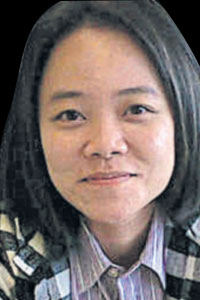For almost three weeks, we have been hearing a string of updates about 40-year-old Surasit Palasak, who was charged with the rape of a 17-year-old girl. This is not a straightforward rape case, by the way, because Surasit, a native of Si Sa Ket province, has claimed to be spirit medium of Fiery-Eye Hermit. A surprise twist here is that Surasit has suffered from polio since birth, at least according to his mother.
Polio hermit? Two words that shouldn't go together but they do. That Surasit suffers from congenital polio makes things even more perplexing, because, from what people see through the news cameras, they wonder a body with such distorted limbs could do what it's been accused of doing.
According to press reports, Surasit -- the hermit -- performed a blessing ritual straight from 10am-5pm on Aug 25 for the victim and her family members at his house before demanding that all of them attend another ritual on the following day where the hermit would chant a spell to ward off bad luck and evil. This second episode, however, had to be carried out at a resort where the hermit was a frequent guest. Unfortunately, the girl's family got stuck in other engagements, so they couldn't attend the chanting. So, besides another father-daughter duo who are also believers and who stayed in another room, at the resort the 17-year-old was left alone with the hermit, who has denied all allegations.
To solve this mysterious case, many news reporters have chosen to play the role of police officer, or Sherlock Holmes. They dug into the history, investigate and find clues wherever they can think -- Surasit's family and neighbours, the victim's relatives, the owner of the resort where the alleged rape took place, staff at a youth shelter where the victim is being rehabilitated, even a medical doctor who could clarify if a polio sufferer can achieve and maintain an erection.
On the surface, this could probably be classified as a sexual-assault case -- a local, non-celebrity #MeToo incident wherein the victim dared to come out and speak, pointing her finger at the one who allegedly did bad to her, even though she is underage.
But is this an inspirational #MeToo story? Perhaps not. After all, this is not just a story about everyday sexual harassment. This 17-year-old girl is potentially a victim of not just a crippled sexual predator but also of the delusional state of people around her -- her own family, to be more precise -- who put their trust blindly in the partially paralysed man who claims to be a hermit who can drive away misfortune with his chanting and some sacred acts. Their feeling of trust was so overwhelming that they could allow their teen daughter to go to a resort with a stranger -- away from their watchful eyes.
Now the legal fight is on between two sides: the polio-infected hermit medium and the easily deceived rape victim. Both have explanations, of course, some more reasonable than others. Surasit admitted he did have sex with the 17-year-old girl, but he wasn't the one initiating it, meaning it shouldn't be considered rape. At the same time, the victim, now in a rehabilitation centre, described how things happened. Some say Surasit isn't as crippled when press cameras are off.
While the case is being solved from a legal perspective, the root cause of this whole issue has hardly been touched. Spiritual belief is a big part of this country -- there is no doubt about it. For many, it runs in their bloodstream and gives them light through life's darkest hours. Spiritual belief gives power and confidence to people fighting poverty, misery, sickness and everything else.
But there's a fine line between spiritual belief and delusion. Thailand is full of things like these. Deities. Cults. Meditation masters. A banana tree that bears fruit at the middle of its trunk. Candle dripping in a holy water bowl. Multiple-headed creatures. A three-legged cow. Luk thep dolls. Hermits. Amulets. Talismans. Somehow it's hard to tell which one of these people should still put their faith on.
During the time of Lord Buddha, the Kalama people of India were facing a situation very similar to this, in which they did not know which teacher they should believe because each of them claimed that his doctrine was the only truth and that others were all wrong. The Kalama therefore discussed this dilemma with Lord Buddha, who gave them a teaching called kalama sutta.
Part of kalama sutta suggests that we do not accept and believe just because something has been passed along and retold through the years, just because some practice has become traditional or merely because of the reports and news spreading.
In essence, kalama sutta is all about thinking carefully before believing what you hear or see.
Polio hermit? Two words that shouldn't be together. Now think more carefully before believing him or anything along this line.
Arusa Pisuthipan is the deputy editor of the Life section of the Bangkok Post.
